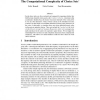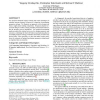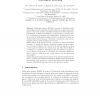904 search results - page 154 / 181 » Game Theory |
100
click to vote
TARK
2007
Springer
15 years 6 months ago
2007
Springer
Social choice rules are often evaluated and compared by inquiring whether they fulfill certain desirable criteria such as the Condorcet criterion, which states that an alternativ...
123
Voted
SIGECOM
2006
ACM
15 years 6 months ago
2006
ACM
Structured peer-to-peer systems allow to administer large volumes of data. Several peers collaborate to generate a query result. Analyses of unstructured peer-to-peer systems, nam...
97
Voted
SIGECOM
2006
ACM
15 years 6 months ago
2006
ACM
Our proposed methods employ learning and search techniques to estimate outcome features of interest as a function of mechanism parameter settings. We illustrate our approach with ...
108
Voted
ATAL
2005
Springer
15 years 6 months ago
2005
Springer
State estimation consists of updating an agent’s belief given executed actions and observed evidence to date. In single agent environments, the state estimation can be formalize...
146
click to vote
LAMAS
2005
Springer
15 years 6 months ago
2005
Springer
Abstract Multi-agent systems (MASs) is an area of distributed artificial intelligence that emphasizes the joint behaviors of agents with some degree of autonomy and the complexiti...



